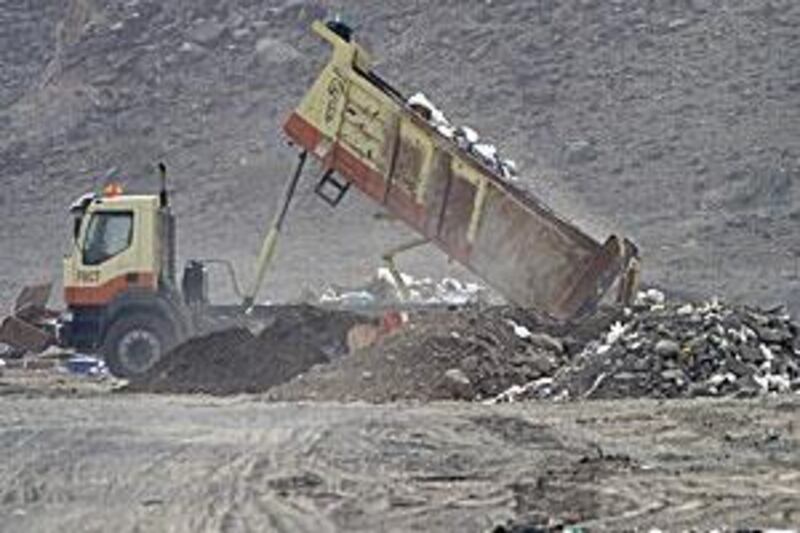SAKEMKEM // A rubbish dump used by the local municipality and private businesses is edging dangerously close to people's homes in this Fujairah village, residents claim. For more than a year, they say, materials including scrap metal, building waste, crude oil, sand, household items and various unidentified substances have been unloaded metres away from houses and a primary school. Much of the waste is exposed and parents have begun restricting children's playtime outside because they fear that the dump may harbour hazardous materials. "There are always tyres and chemicals from free-zone companies that are being burned here," Saif al Mazrouei, 34, an Emirati who lives in Sakemkem with his wife and six children, said of the nearby Fujairah Free Zone. He counted at least five fires last month on the site: "The smoke is thick-black, and it comes into your house." He and others said Fujairah Municipality posted signs warning people not to unload rubbish in the area, but local government vehicles continued to do so. "Look, they put up a sign over there that says 'no dumping', and they are still dumping right next to it," Mr Mazrouei said, pointing to mounds of bin bags piled high beside the signs.
"Almost every day you see municipality vehicles coming here and dumping sand over the trash. They aren't helping; they're making the problem worse." Saif al Afham, the general manager of Fujairah Municipality, said he would do his utmost to resolve the situation and welcomed suggestions from Sakemkem residents. He said the municipality had a plan in place to move the rubbish to a different site. "I know about this issue and I've recently ordered that the trash be moved to a different location, in Al Hayl," he said. "My door is always open, and I'm ready to listen to anyone's concerns." Mr al Afham said the Sakemkem dump was a "temporary measure", and everything that had been dumped there would be moved to the new location. However, Mr Mazrouei said he had approached the municipality and the free zone on a dozen occasions about the issue, and complained that officials repeatedly brushed him off. "Every time I go to the free zone or the municipality, one official tells me to see another official, who tells me to go to another, and then on and on and on," he said. "They're just passing me off to each other, not taking any responsibility. It's always Inshallah or boukra tomorrow with them. They haven't done a thing. Not a thing." Musabah al Yan, 39, an Emirati and owner of a rental-car company who lives in Sakemkem with his wife and six children, said: "I can tell you that our village is 100 per cent unsafe to live in. From the smells, the garbage, dust, it's dangerous here. "Our main concern is for the children, because they like to play near the mountains. We are people of Bedouin heritage who want our children to be familiar with nature, but it's dangerous now for them to play outside. "We don't know exactly what's in the rubbish, but for all we know, it's hazardous material. The place is full of flies and insects that feed off the rubbish." Officials in Fujairah have for years struggled to manage the side effects of booming industry in the area. An estimated 58 rock quarries, which supply gravel to developments in Dubai and several GCC countries, emit clouds of dust over the area that have been blamed by local physicians for an unusually high incidence of respiratory ailments. Officials have vowed to rein in industry and have begun temporarily shutting down rock crushers and compensating individuals whose health has been affected by dust from the quarries. But residents of Sakemkem, flanked by a large rock quarry, the free-zone Port of Fujairah and the dumping site, have long said their community is bearing the brunt of development. They complain of the smell, caused by natural gas fumes, and of breathing difficulties because of dust. Mr al Yan said the situation had become so bad that neighbours have begun questioning whether it is beneficial for the country to continue on its development path. "When you look at Sakemkem, you would think that [development] would have produced noticeable benefits [such as] new roads, better infrastructure," he said, commenting on the unpaved roads in the village. "But there's been no contribution; this has done nothing to help us. Sakemkem is being neglected." hnaylor@thenational.ae






